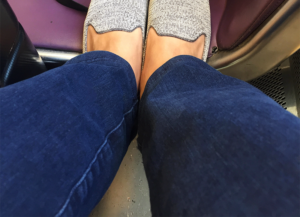Well … that escalated quickly.
I recorded this episode in two sessions, last Thursday and Friday. You know, 72 hours ago, a simpler time.
If you’re looking for a time capsule that gives you a historic glimpse of, uh, LAST FRIDAY, then you’ll love this episode. And you’ll wonder how Friday seems like such a distant memory.
I spend the first 30 minutes of the episode discussing the bear market and the serious coronavirus threat, plus I offer 7 tips for managing your money during this crisis. Quick highlights:
- Don’t panic sell.
- Don’t try to time the market.
- Make sure your investments fit your timeline.
- If you’re tempted to buy on the dip, don’t raid your emergency fund for it.
I’ll also be putting out a blog post later today (let’s be real, it’ll be late late tonight) about how to handle the collapsing markets.
Before I sign off, I must take this opportunity to emphasize what is perhaps the single most important message I could ever communicate:
Please. Take. This. Seriously.
Yes, I know that the media sounded many false alarms in the past. The media is having its Boy Who Cried Wolf moment. This time, the wolf is real.
After a lot of reading, I am convinced that the coronavirus threat is one of the most serious — if not THE most serious — known threat in our lifetime to date. I say this not to induce panic (and please please don’t stockpile), but rather to emphasize the importance of social isolation and social distancing precautions.
Every day counts when we’re battling a pandemic that spreads exponentially. Please read this. And then this. And if you’ve ever doubted the power that one single individual can have (for better or worse), read about South Korea’s Patient 31.
It’s not about you. The virus can be asymptomatic or minimally-symptomatic for 14 days, which means many people are infected and don’t realize it. Even if you yourself make a speedy recovery, you might be spreading it to others who are more vulnerable. And if enough vulnerable people contract the virus, the hospitals will quickly become overwhelmed.
Social isolation is not (just) for your own sake, it’s for the sake of everyone around you. Do it for grandma. Do it for your cousin with asthma. Do it for Tom Hanks.
The number one priority right now is to flatten the curve.
Please, please, do your part to help us flatten the curve.
As someone said on Twitter:
“Ask not what sitting on the couch can do for you. Ask what sitting on the couch can do for your country.”
__________
And with that, we turn to our regularly scheduled programming —
__________
Caroline wants to buy her first home in Denver, CO. How can she calculate how much mortgage she can comfortably afford?
Anne plans to retire later this year on rental income (woohoo!). She’s saved up a hefty emergency fund for her properties, and she wants to know 1) if she should invest a portion of this in index funds, and 2) whether she should rebalance her portfolio to account for this huge cash allocation.
Anonymous Nurse has over $100,000 in debt, not including their mortgage. They want to invest in rental properties, but with so much debt, they’re thinking of selling their home or renting it out. Which option is best given their interest in real estate?
Joy wants to know if she should put $50,000 towards her primary residence mortgage, or use it as a downpayment on her first rental property. What are the pros and cons of each option?
Anonymous owns a cash-flow positive condo…on leased land. The land will revert back to the owners in 32 years. When is the best time to sell this property?
I answer these five questions in today’s episode. Enjoy!
Caroline asks (at 32:14 minutes):
I’m buying my first home in Denver, CO with a downpayment in the 10 to 12 percent range. My question is related to DTI and how much house we can afford.
Our annual income before taxes is approximately $155,000 per year and our only monthly debt is a $300 car payment that we tend to overpay. We have three years left on it.
With those numbers, what’s a comfortable mortgage loan amount for us? What percent of our income should we allocate towards the mortgage each month? Do we factor this before or after taxes?
Anne asks (at 44:49 minutes):
I plan to retire primarily on rental income later this year. I live in a high cost of living area and have invested in multi-families. I have a 10-year plan for all capex and maintenance for each individual property. It includes everything that could possibly need replacing. It’s highly unlikely that all these contingencies will happen in the next 10 years, but I would rather be safe.
I have 75 percent of that total 10-year capex budget — about $180,000 — in cash. I’ve built the balance of that capex, plus regular maintenance and vacancy, into my monthly retirement budget, which is about $1,500 per month. This way I can live on the bigger part of the cash flow of the rentals.
All of the properties are in very low interest fixed-rate mortgages and I hold over 40 percent in total equity. I created my financial independence budget and have been living within those means for discretionary spending for the last year to be sure I’m budgeting right.
My plan is to have the multi-family rentals cover my basic needs over the next 10 years and explore some fun interests for part-time work. After 10 years, I’ll evaluate whether to keep those properties or sell them off (if it feels like too much work, or if selling makes sense for my financial goals at that time).
My questions are:
- Is there anything else I should save for while I have a great income?
- The $180,000 for capex is in a high-yield savings account. Given that it’s 10 years of possible spend, should I put a portion of that into index funds to gain better growth? Putting 30 percent away would leave me with seven years in cash.
- I have a 401k and a chunk of money in index funds already, almost all of which is in stocks versus bonds, given my heavy cash position. Should I rebalance that for more bonds? I know I’ll need to do this once 10 years closes in.
Anonymous Nurse asks (at 58:47 minutes):
My partner and I are nurses living in West Virginia. We plan to live here for another five to ten years (it depends on if we stay here for grad school). I have $20,000 in credit card debt, $80,000 in student loans, a car loan, and a mortgage. We’re engaged to be married in two years, so we’re saving for that as well.
We want to start a rental property business, but I know our debt will work against us. To gain more money to put towards this business, we thought about selling our house or renting it out. We’d become renters again and save more money. Together, we earn $5,000 per month and pay $1,200 on our mortgage. The rest of the money goes straight to our other debts.
Our house is in a Class B neighborhood and 10 minutes away from the hospital and downtown. There are a lot of healthcare professionals in this area, so it has good potential as a rental. But I think we need extra cash flow.
We hope to retire at 50-55 years old, and we’re close to 30 years old.
Since I love real estate, I thought about getting a real estate agent license so that I can work part-time as an agent. I could even use that in retirement. It wouldn’t be a waste of time, but I don’t know if I need it.
Joy asks (at 1:14:20 minutes):
I was a surrogate last year for an amazing family and we want to complete the process again. We’re wondering how we can best use the $50,000 that we’ll receive.
The only debt we have is our primary residence mortgage: $178,000 on a 15-year loan at a 3.9 percent interest rate.
One of the two options is to pay off a good chunk of the principal on our home. Our payments are around $1,700 per month, and not having to pay a mortgage would be amazing.
The other option that excites me is investing in real estate. We would have enough for a downpayment and an emergency fund to cover a rental property.
What are the pros and cons of both options?
Anonymous on Lease asks (at 1:24:25):
Around 15 years ago, I moved to a high-cost-of-living city where I purchased a one-bedroom condo for $100,000. I paid it off quickly, moved away, and turned it into a rental unit. It nets around $10,000 per year. But there’s a catch.
The entire apartment complex is a co-op that was built on leased land. In 32 years, this complex will revert back to the owners of the land. When should I sell this apartment? How should I compare this to other properties?
Resources Mentioned:
- Chart of the Dow Jones from 1896 – 2016
- Side Hustle School podcast
- Sidehustleschool.com
- Side Hustle Nation podcast
- Sidehustlenation.com
- How to Live a Remarkable Life in a Conventional World, with Chris Guillebeau
- How to Side Hustle Your Way to Success, with Nick Loper
Thanks to our sponsors!
Gusto
Gusto makes payroll, benefits, and HR easy for modern small businesses. In fact, 72% of customers spend less than 5 minutes to run payroll! If you sign up at gusto.com/paula, you’ll receive 3 months free once you run your first payroll.
Native
Native creates safe, simple, effective products with trusted ingredients and performance. Their deodorant doesn’t have aluminum and comes in a wide variety of scents for everyone. You can try it risk-free as Native offers free returns and exchanges in the US. Want to give them a try? Enter promo code paula during checkout for 20% off!
Rothy’s shoes are stylish, sustainable, and comfortable for every day wear, anywhere. They come in four styles, their lineup is updated often, and I love that they make flats from recycled plastic water bottles! If you want to order a pair, go to rothys.com/paula.

I’m wearing my Betabrand pants and Rothy’s shoes on a flight – they’re that comfortable!
Betabrand
Most of us find ourselves in situations where we need to wear dress pants, whether it be for work, a conference, or a meeting. If only you could wear comfortable pants to everything, right? Well…now you can! Betabrand offers dress pant yoga pants, and they’re as awesome as they sound. Check out betabrand.com/paula and get 20% off one pair.
